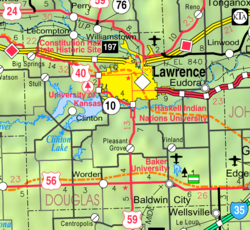Eudora, Kansas
| Eudora, Kansas | |
|---|---|
| City | |

Statue of Pascal Fish and his daughter Eudora (2011)
|
|
 Location within Douglas County and Kansas |
|
 KDOT map of Douglas County (legend) |
|
| Coordinates: 38°56′18″N 95°5′51″W / 38.93833°N 95.09750°WCoordinates: 38°56′18″N 95°5′51″W / 38.93833°N 95.09750°W | |
| Country | United States |
| State | Kansas |
| County | Douglas |
| Government | |
| • Type | Mayor–Commission |
| • Mayor | Tim Reazin |
| • City Manager | Barack Matite |
| • City Clerk | Pamela Schmeck |
| Area | |
| • Total | 2.94 sq mi (7.61 km2) |
| • Land | 2.89 sq mi (7.49 km2) |
| • Water | 0.05 sq mi (0.13 km2) |
| Elevation | 833 ft (254 m) |
| Population (2010) | |
| • Total | 6,136 |
| • Estimate (2015) | 6,378 |
| • Density | 2,100/sq mi (810/km2) |
| Time zone | Central (CST) (UTC-6) |
| • Summer (DST) | CDT (UTC-5) |
| ZIP code | 66025 |
| Area code(s) | 785 |
| FIPS code | 20-21675 |
| GNIS feature ID | 0479162 |
| Website | CityOfEudoraks |
Eudora is a city in Douglas County, Kansas, United States. The city is located along the Kansas and Wakarusa Rivers. As of the 2010 census, the city population was 6,136.
The history of Eudora predates American settlement. The Eudora area was home to various Indian tribes for thousands of years. The most notable tribe was the Kansa. The Kansa lived along the rivers of this region in villages until they were forcibly removed in the 1820s by the American government to make room for the Shawnee. The Oregon Trail and Santa Fe Trail passed through the region, just a few miles south of modern Eudora.
In 1854 the Kansas-Nebraska Act was passed, creating the Kansas Territory and opening the region to settlement by Americans. As a result of the Kansas-Nebraska Act, Americans settlers started to encroach upon Indian lands. In 1856, three members of a German Immigrant Settlement Company (called Deutsche-Neusiedlungsverein) from Chicago, sent out a location committee to choose a town site in the new Kansas Territory. Favoring the Eudora area, they drew up contracts with Shawnee Chief Paschal Fish, the original owner of the town site. The new town was named Eudora in honor of Chief Fish's daughter. The first post office in Eudora was established in September, 1857. Eudora was incorporated in 1859.
Eudora was the site of conflict during the Bleeding Kansas Era and the American Civil War. Eudora strongly supported the Union during the Civil War, many of its men enlisted to defeat the Confederacy. William Quantrill passed through the Eudora area in 1863 on his way to Lawrence, Kansas to commit his infamous and deadly raid on the unsuspecting town. Several Eudora residents attempted to warn Lawrence of Quantrill's proximity, but two men were thrown from their horses, one of them dying as a result of his injuries. After the raid, Eudorans were quick to aid the citizens of Lawrence as they started their recovery.
...
Wikipedia
